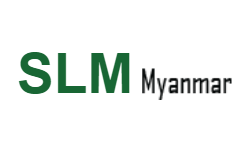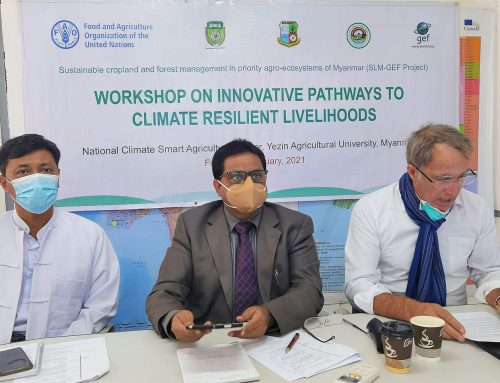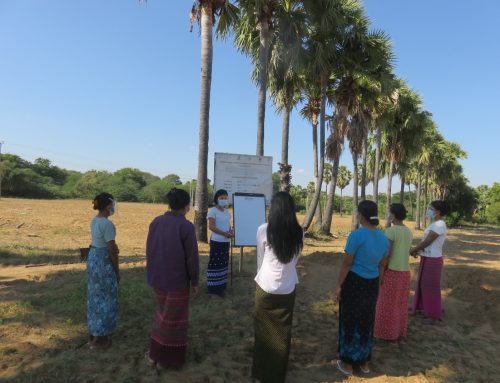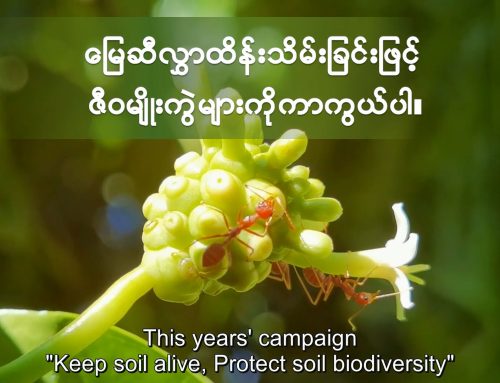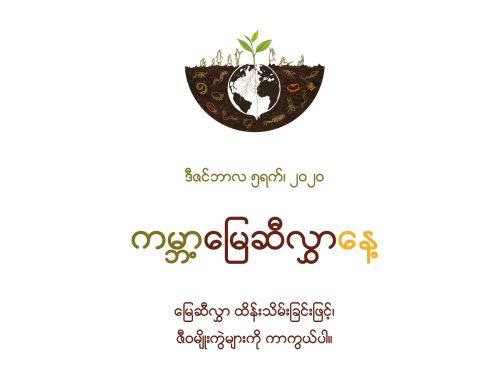 Myanmar is highly vulnerable to climate change and extreme weather conditions. According to the Global Climate Risk Index, Myanmar ranks among the top three countries most affected by weather related events, which has led to massive displacement of people and the destruction of livelihoods, crops and other food sources. In the recent years, the change in the climate has been impacting agricultural production negatively, which potentially can lead to food insecurity.
Myanmar is highly vulnerable to climate change and extreme weather conditions. According to the Global Climate Risk Index, Myanmar ranks among the top three countries most affected by weather related events, which has led to massive displacement of people and the destruction of livelihoods, crops and other food sources. In the recent years, the change in the climate has been impacting agricultural production negatively, which potentially can lead to food insecurity.
In order to build the capacity of farming and forestry stakeholders at various levels to mitigate climate change and improve land conditions, a project entitled “Sustainable Cropland and Forest Management in Priority Agro-ecosystems of Myanmar” was commenced by FAO Myanmar in July 2016. The five-year project (2016-2021) is funded by Global Environment Facility (GEF) and being jointly coordinated and implemented by the Ministry of Natural Resources and Environmental Conservation (MoNREC) and the Ministry of Agriculture, Livestock, and Irrigation (MoALI), and FAO-Myanmar (FAO-MM). The project is supporting the adoption of policies and practices for sustainable land management (SLM), climate smart agriculture (CSA), and sustainable forest management (SFM).

In order to coordinate development, packaging and promotion of best practices for CSA systems and to conduct advocacy activities related to CSA/SLM, the project has supported establishment of a National CSA at Yezin Agriculture University. The National CSA Center was jointly opened by His Excellency Dr. Aung Thu, The Union Minister for Agriculture, Livestock and Irrigation and myself as a FAO Representative in Myanmar on 17th August 2018. A CSA Technical Support Group (TSG) has been formed representing a national cohort of Myanmar’s best experts associated with CSA/SLM approaches to coordinate among the relevant stakeholders, make strategic decisions and guide effective operationalization of the CSA Center. The TSG comprises of 21 members representing DoA, DAR, DoP, DALMS, FD, I/NGO’s, YAU and FAO.
One of the key activities of the National CSA Center is to organize an annual workshop/conference to share ideas, opportunities, and challenges with regards to CSA and SLM and to discuss on the way forward. Such workshops will focus on different themes of CSA and SLM every year. Accordingly, the first workshop was organized by the CSA Center at YAU on 14th Sep 2018 and the theme of this workshop was “Promoting Climate Smart Agriculture in Myanmar”.
During the opening session of the workshop U Aye Maung Sein, Honorable Nay Pyi Taw Council Member, highlighted the impact of climate change in Myanmar and need for promoting climate smart agriculture to mitigate climate change. On behalf of FAO, Mr. Xavier Bouan, the Senior Technical Advisor, highlighted the FAO’s overall contributions in Myanmar with the special focus on the SLM-GEF Project’s objectives and interventions and extended best wishes for a successful workshop. Dr. Nang Hseng Hom, the Rector of YAU extended the words of acknowledgment and presented the objectives of the workshop.
The workshop was attended by more than 100 participants representing relevant Government Departments from MoALI and MoNREC, YAU, State Agriculture Institute, I/NGOs (Cesvi, AVSI, COLDA, IIRR), IRRI, JICA, JIRCAS, and FAO. A total of 16 papers received from YAU, Department of Agriculture, Department of Agriculture Research, State Agriculture Institute, Forest Department and FAO, grouped into three broader topics/sessions, were presented in the workshop. The sessions on “Concept of Climate Change and CSA” and “Resistance to Climatic Stress” covered five papers each while the session on “Forestry/Agroforestry, Disease, Pest and Nutrients Management” included six papers. The presentation and discussions were followed by a Group Work on “how to promote CSA in Myanmar (issues/challenges, opportunities, and recommendations)” and on “how to make CSA Center effective and sustainable” where the recommendations from the four Groups were presented in the plenary session and feedbacks were received.
The workshop was successful and very useful in terms of sharing ideas, experiences, research findings and extension tools/models on the topics related to promoting CSA in Myanmar. During the closing session of the workshop, Mr. Xavier Bouan from FAO and Dr. Mie Mie Aung, a Professor from YAU, congratulated all the participants for successful completion of the workshop and extended heartfelt thanks to all for active participation and invaluable contributions.
